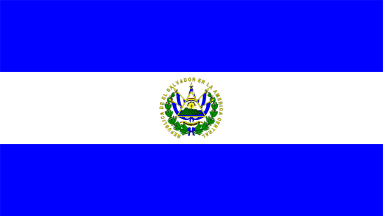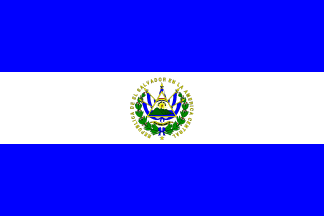 (189:335)
(189:335)
by Željko Heimer, 7 January 2003

Last modified: 2014-05-29 by zoltán horváth
Keywords: el salvador | phyrigian cap | volcano | rainbow |
Links: FOTW homepage |
search |
disclaimer and copyright |
write us |
mirrors
 (189:335)
(189:335)
by Željko Heimer, 7 January 2003
See also:
The military flag of El Salvador is pure blue over white over
blue flag with the state's coat of arms, ratio 189:335. The
military flag is used by the goverment on land and the military
forces on land and sea.
The coat of arms itself is similar to Nicaraguan, but more
complicated, with five flags around the triangle and green
branches. Text around it sais: REPUBLICA DE EL SALVADOR EN LA
AMERICA CENTRAL. In the middle of the triangle above the cap
is the date 15 DE SET DE 1821 (15th of September, 1821),
the independence day.
Željko Heimer, 29 Febuary 1996
At "Nouveau Petit Larousse Illustre" (1926) - El
Salvador has a version of the emblem with four flags but without
any text around it. The triangle looks like a red sea in front of
blue mountains, with a liberty cap above them, but it may have
been hard to put all the exact details in a 3mm high triangle.
Peter Hans van den Muijzenberg, 29 October 2000
According to Album 2000 [pay00]:
- National Flag and Naval Ensign (-SW/--W 189:335) -
Blue-white-blue triband with the national coat of arms in the
middle of the white stripe. The coat of arms I used is by Graham
Bartram (see: National Flag and Naval
Ensign) though at this size it is probably not that
important. I noted that the modern representation (both Graham
and Armand) do not include the five-pointed star at the base of
the circular inscription, that is found in older images, like
Flaggenbuch and National Geographics 1917.
Željko Heimer, 7 January 2003
![[State flag seal of El Salvador]](../images/s/sv-seal.gif)
by Graham Bartram, 10 July 1997
El Salvador's state flag shows a central triangle featuring
the sun behind a pole with a Phrygian cap on it.
Graham Bartram, 10 July 1997
Can anyone explain me - what inscription is around sun and
Phrygian cap on Salvador's Coat of Arms? And in which color it
should be (on <www.uscsu.sc.edu>
inscription is red; on Graham's Coat of Arms - black)
Gvido Pētersons , 11 September 1999
In the rays of the sun there is a date - 15 DE SEPTIEMBRE DE
1821 (the date of liberation from Spanish rule)
Source: Concise Encyclopaedia of Flags & Coats of
Arms, 1985. There it is stated too: 'The most recent law
regulating the coat of arms was issued in 1972.
I searched the web for El Salvador's flag and there seems to be a
lot of agreement on one thing: they're all different regarding
the Coat of Arms, there was even one colored on black (ministry
of the Interior).
There is a long explanation of the flag (including biographies of
poets who wrote peoms on the flag) at: <www.asamblea.gob.sv/bandera.htm>
and a long explanation of the Coat of Arms at: <www.asamblea.gob.sv/escudo.htm>.
Jarig Bakker, 11 September 1999
It certainly is the Official Website of the Legislative
Assembly (Congress). it says:
COAT-OF-ARMS - As for the Coat of Arms webpage, it starts
describing the Coat of Arms which is quite similar but not
identical to that of Honduras which I just sent: An equilateral
triangle. On its base five volcanos bathed by two seas, on its
top a rainbow and below it a red frigian cap spreading light.
Superimposed on this light a semicircular motto "15 DE
SEPTIEMBRE DE 1821". Around the triangle the gold lettering:
"REPUBLICA DE EL SALVADOR EN LA AMÉRICA CENTRAL"
[Republic of El Salvador in Central America]. Below the triangle
the motto "DIOS UNIÓN LIBERTAD" and on each side of
the triangle two flags with stripes blue-white-blue, and one more
on top of the triangle, all of them with a lance-topped finial.
Two encircling laurel branches, each with seven bunches of
leaves.
The original design of this version of the CoA was made by Rafael
Barraza Rodríguez who won a 1912 contest by the War and Nay
Ministry which had 30 entries. Initially it did not have the five
flags nor the laurel branches. It was approved by Decree of the
National Assembly on March 20th 1916.
Santiago Dotor, 15 September 1999
In Flaggenbuch (1939-41) [neu92]
- no inscription.
In Smith (1975) [smi75a] - 15 DE
SEP 1821, in red (independence date)
In Album des Pavillons (1995) [pay]
- 15 DE SEPTIEMBRE 1821, in gold on the image. But the text adds:
sometimes abbreviated as 15 DE SEP. DE 1821
In DK Pocket Book (1998) - 15 DE SEP 1821, in black
We can easily disqualify Flaggenbuch as outdated. The inscription
seems consensual, but not its colour! Gold letters incircled by
golden sunrays are really difficult to read, and might have been
'highlighted' in red or black for the sake of clarity (as it is
sometimes done with ancient stone-carvings.)
It is a very complex arms: an emblem including a date, upon a
scroll including the national motto, the whole surrounded by the
extended name of the country.
Ivan Sache, 11 September 1999
From El
Salvador Embassy in USA site:
"THE NATIONAL COAT OF ARMS CONSISTS OF THE FOLLOWING:
FIVE FLAGS - Five fraternal Central American countries (El
Salvador, Guatemala, Honduras, Nicaragua and Costa Rica).
BLUE STRIPE ON THE FLAGS - The sea and the sky
WHITE STRIP ON THE FLAGS - Peace
FOURTEEN LAUREL LEAVES - Fourteen Departments (or States) of the
Republic of El Salvador
PHRYGIAN CAP - The cap of liberty
FIVE VOLCANOS - Represent the Central American Isthmus which
represent the five nations in the isthmus, washed by the two
oceans
OCEANS - Pacific and Atlantic oceans
EQUILATERAL TRIANGLE - Equality of individuals. The three
Branches of the Republic (Executive, Legislative and Judicial)
RAINBOW - Hope
GOD, UNION AND LIBERTY - The Republic of El Salvador is based on
this principle
BOW (KNOT) - Unity
SEPTEMBER 15, 1821 - Day of Independence of the Republic of El
Salvador"
Dov Gutterman, 21 January 2002
According to Album 2000 [pay00]
- Detail (i.e. the coat of arms) - Note explains that both 15 DE
SEPTIEMBRE DE 1821 as well as shortened 15 DE SEP. DE 1821 are
used.
Željko Heimer, 7 January 2003
In the center of El Salvador coat of arms I see there several
rays but as an "aureola" of the phrygean cap, not a
sun. In the Spanish text they say: "Bajo el arco iris, el
gorro frigio de color encarnado, esparciendo luces...",
which means that it is not the sun but the phrigean cup who
"brights". I agree that they seams like the rays of a
sun but I think that they are not. It seems that this
Phrygean cap is traced by the old engravers who designed that
"brightness" as rays of a sun, the same rays that we
can "see" when we see directly to the sun or a turn on
lamp...
Luis Havas, 16 and 19 November 2004

by Željko Heimer, 7 January 2003
Looking in Flaggenbuch 1939 [neu92]
it seems that Salvadorean flag has not changed much since. Naval
Ensign and Flag of Diplomatic Missions Abroad (2:3~) - As today,
but including a five-pointed star in the base. In the National
Geograpic Magazine 1917 Flag Number there are is No. 506.-
Salvador Ensign (4:7~) - With coat of arms (also with the star in
base as in Flaggenbuch).
Željko Heimer, 7 January 2003